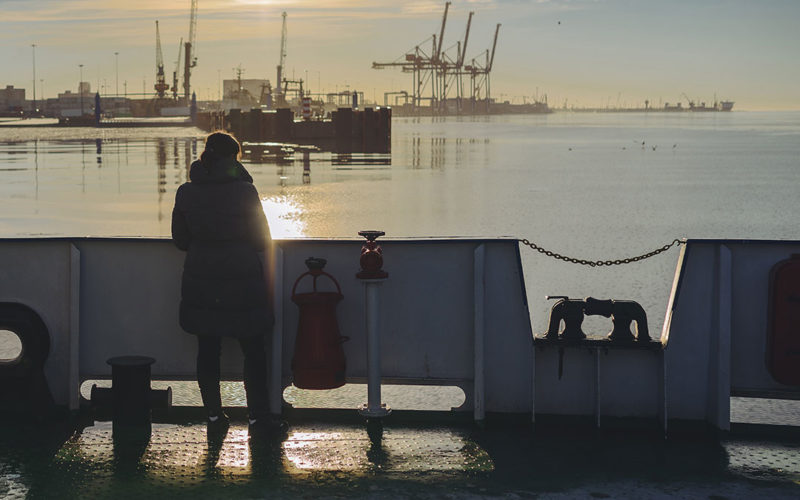
C.W. was a cook on a Military Sealift Command (MSC) vessel. The ship’s chief steward, the head of the civilian hospitality crew, began spending a lot of time in the galley, just standing around and socializing. “He would dawdle,” she recalled.
He began by complimenting her cooking. “You cook really well,” he said. “I’m surprised you aren’t married.”
It seemed like a test balloon to see if he could go further. C.W. said he greeted her with “Good morning, babe.” He escalated to “You be fine.” He whistled at her and sang the chorus of an explicit song by the rapper Foxy Brown. He often tried to touch her. At various times, C.W., 29, ignored him, reminded him of his age or plainly stated she was on board just to cook.
One day, C.W. was alone in the kitchen. She wore one wireless earphone, as was her habit when doing prep work. She suddenly felt something against her buttocks. It was the steward’s crotch. She turned around startled and yelled. “He just walked away like nothing happened,” she said. “I didn’t realize it was an assault until it was over.”
C.W. reported the incident to her immediate supervisor, who reported it to the Naval Criminal Investigative Service (though they were both civilians, it was a U.S. Navy ship). Eventually, the chief steward was charged with simple assault, a misdemeanor, and faced a trial in federal court in Virginia in 2015. Court records show that the judge heard testimony and found the defendant not guilty. An MSC representative said the command “can’t speak to the details” of the case.
The court action would not happen for several weeks, however. For the remainder of the voyage, C.W. slept with a chair against her cabin door.
She said the stress of the incidents had caused her to suffer insomnia, hair loss and weight loss. Her clothes became baggy and when her 93 days on the ship were over, she had lost 20 pounds.
Sexual harassment of female seafarers, many industry observers say, is widespread and intensified by unique aspects of the work: an overwhelmingly male workforce, long assignments in close quarters, reliance on hierarchy, and a culture of pushing aside conflict to fulfill senior officers’ expectations for a smooth operation.
“The problem can be quite challenging because you are meeting for food and work in the same room (as the harasser),” said Dr. Momoko Kitada, an associate professor at the World Maritime University in Sweden who studies issues affecting female seafarers. “You’re always making sure that person is not hiding behind the curtains.”
If the perpetrator is a senior officer, the captain may be less inclined to take the accusations seriously because of their bond. “Senior officers are trusted on everything,” Kitada said.
There has not been a comprehensive effort to quantify the problem throughout the global maritime industry. In a 2000 survey conducted by the United Kingdom’s National Union of Marine, Aviation and Shipping Transport Officers, 76 percent of female seafarers said they had encountered some form of sexual harassment. A survey for the U.K.-based anti-harassment organization Safer Waves, involving male and female mariners, found that 58.8 percent had experienced sexual harassment.
Colloquially, many maritime professionals say it’s more common than not that a female mariner has been harassed on a ship.
“Absolutely, I think it’s the majority,” said Ally Cedeno, founder and president of the Women Offshore Foundation. She said to consider the numbers: According to the International Maritime Organization, just 2 percent of seafarers are female. If there is only one sexual predator on board, the one or the few women on the ship will be his target.
A 2006 report from the Seafarers International Research Centre did not look for exact numbers but concluded, “Women working at sea aboard cargo vessels are very likely to experience sexual harassment and bullying. Young women in low status positions on board may be particularly vulnerable to sexual harassment.”
The report noted that victims of harassment at sea cannot even get a reprieve at the end of a workday. As one woman interviewed put it: “You can’t escape from it. It’s like, if you’re at work (ashore), you get harassed, you come home, you forget about it. (When) you’re on a ship, you get harassed, you go to your cabin — you’ve got a phone in your cabin, they ring you constantly. They’re knocking at your door, they’re walking up and down the alleyway.” In one case, a female mariner reported finding pornographic pictures that someone slid beneath her door.
The isolation of a ship also means that victims typically can’t reach out to other women for support. “I’m alone in a world of men,” said one interviewee, “so anything can happen out at sea where I cannot shout for help and all that.”
The problem of sexual harassment is entangled with other gender issues. Some male seafarers question the right of women to work in the industry. If female mariners report sexual harassment, they fear it will play into the perception that their presence is an intrusion or an inevitable source of tension.
“There are a lot of people nowadays who will use your gender against you,” Cedeno said. “I am already being told I am a diversity hire. If there is any problem, I am going to get the blame.”
Terri Christie, who used to work as a cook on inland towboats, said she heard comments during the workday that women don’t belong on ships. She also once had a superior condescendingly pull out her chair for her at dinner and complain about his wife in an obvious bid for romantic affection.
“They seemed to go hand in hand,” she said. “If I don’t have a place (as a worker) on the ship, of course I should be used as something else.”
Kitada said ship captains tend to see personnel problems as an obstacle to efficiency rather than as matters of fairness or sensitivity.
“I think it’s a culture that whoever is making trouble on board, they are the most vulnerable, particularly those in the lower ranks — even if they are not creating the problem,” she said. “They are jeopardizing themselves and their career if they come forward. Unethical behavior is accepted as part of ship culture.”
In a paper published last year, Kitada implored the industry to take a zero-tolerance approach because of the “traditional reluctance” of maritime professionals to report any issues on board. “The message needs to be sent from the top that (engaging in) sexual harassment can end your career,” she said.
C.W. left the courtroom where she testified in 2015 as a changed woman. She transferred to the West Coast pool to avoid the man she said had harassed her.
In 2019, she was tipped that he was being transferred to the ship where she was assigned. “I had a panic attack right then and there,” C.W. remembered. “My superior called the medical officer and said, ‘We have to get her off the ship because she’s losing her (expletive).’”
According to the MSC, decisions to separate crewmembers are made on a case-by-case basis. C.W. was already overdue for relief and the captain arranged for her to leave at the next port, the one where the man in question would be getting on.
C.W. moved back to San Diego and went back “in the pool,” awaiting an assignment. Each day, she had to check in with a supervisor. Recently, according to recordings and emails she shared with Professional Mariner, that supervisor asked her to send nude photos of herself.
“It came out of nowhere,” she said. “We had been friends.” The supervisor relented when C.W. threatened to tell his wife.
C.W. hesitated to report him. She spent four years avoiding her last antagonist, only to have her employer transfer him to the same ship. But eventually she emailed superiors at the MSC. At press time, she had yet to hear back from them.
“Whatever happens, happens,” she said with resignation. “I’m not chasing a result. I’m honestly just tired.” •

